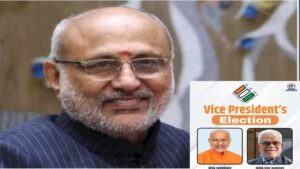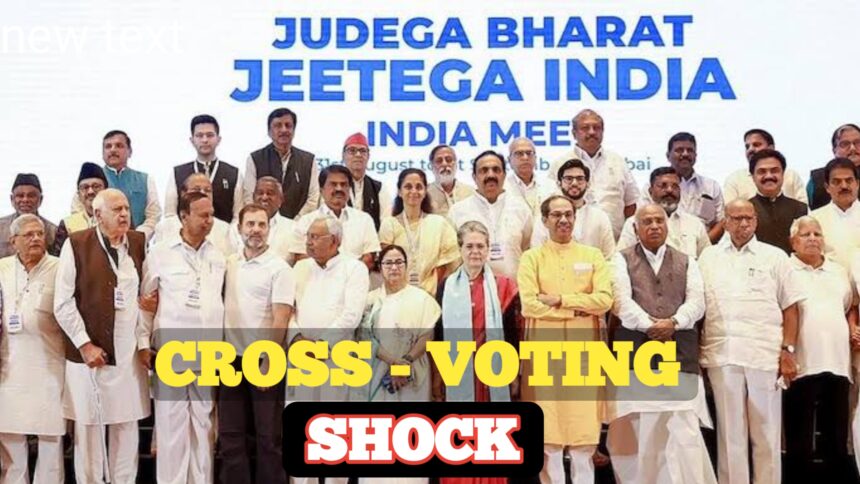Cross-Voting Storm Shakes INDIA Bloc: Allegations, Doubts & Deepening Rift
By| Arvind Jadhav
New Delhi : The Vice-Presidential election has ended with a political earthquake. NDA’s nominee C.P. Radhakrishnan has been elected the 15th Vice President of India with an emphatic 452 votes, defeating INDIA bloc’s candidate B. Sudershan Reddy, who secured just 300 votes. But while the NDA is celebrating, the result has thrown the opposition into turmoil, with allegations of cross-voting, betrayal, and even cash-for-vote deals dominating the political discourse.
⭕ The Numbers That Don’t Match

According to the arithmetic of parliamentary strength, the NDA was not expected to cross 420 votes. Yet, the final count gave Radhakrishnan a comfortable lead of over 150 votes. The INDIA bloc, on the other hand, was projected to deliver around 340 votes but managed only 300. To add to the puzzle, the Election Commission confirmed that 15 votes were invalid, leaving observers and party leaders alike questioning — who switched sides, and why?
⭕ INDIA Bloc in Damage Control
The INDIA bloc is now engaged in damage control as finger-pointing begins within its ranks.
Trinamool Congress leader Abhishek Banerjee strongly asserted that all 41 TMC MPs voted for Reddy, effectively suggesting that parties like AAP or smaller regional outfits may have cross-voted.
Banerjee went further, alleging that attempts were made to buy votes at a price of ₹15–20 crore per MP, though no evidence has been produced so far.
Congress leader Manish Tewari demanded a systematic, independent investigation into the cross-voting claims, warning that the INDIA bloc’s credibility in the eyes of the public has taken a severe hit.
⭕ NDA Turns the Tables
The ruling NDA, instead of denying the speculation, has seized the moment to highlight the “fractured opposition.” Parliamentary Affairs Minister Kiren Rijiju thanked certain opposition MPs for “voting with conscience,” a remark that has only intensified suspicion that INDIA bloc MPs defected during the secret ballot.
For the NDA, this victory not only cements its dominance but also sends a psychological message ahead of upcoming state elections: opposition unity may exist on paper, but not on the floor of Parliament.
⭕ The Shadow of the Secret Ballot
One of the biggest challenges is the nature of the Vice-Presidential election itself — a secret ballot system. Unlike open voting, MPs are not bound by party whips, making it nearly impossible to trace who voted where. With 15 votes invalidated, the picture becomes even murkier. Analysts point out that even if cross-voting did not occur on a large scale, internal sabotage or deliberate invalid votes could explain the INDIA bloc’s shortfall.
⭕ Opposition’s Unity at Stake
The INDIA bloc had pitched the Vice-Presidential election as a show of strength, meant to prove that its 28-party alliance could stand united against the NDA. Instead, the outcome has triggered mutual suspicion, allegations of betrayal, and cracks in trust. Smaller parties are worried about being scapegoated, while larger players like Congress and TMC are scrambling to protect their credibility.
⭕ What Lies Ahead
The controversy is unlikely to fade soon. Demands for an inquiry into alleged cross-voting are growing, but with no mechanism to pierce the secrecy of the ballot, the truth may never be officially known. Politically, however, the damage is clear: Radhakrishnan’s victory has exposed the fragility of the INDIA bloc and given the NDA fresh ammunition to question the opposition’s claim of unity.
As the dust settles, one question looms larger than ever: If the INDIA bloc cannot hold its flock together in a secret ballot, how will it face the NDA juggernaut in the 2026 general elections?








